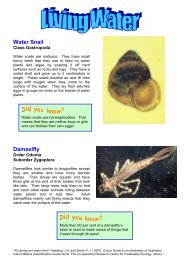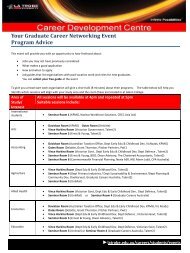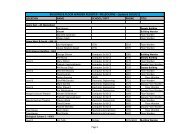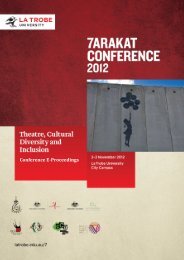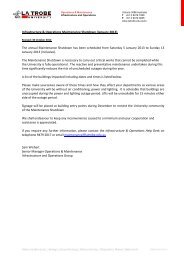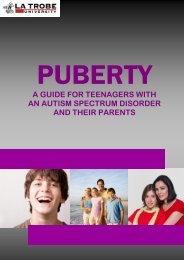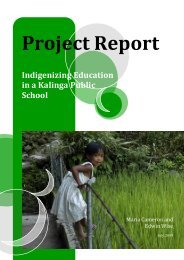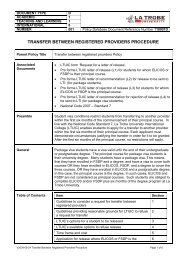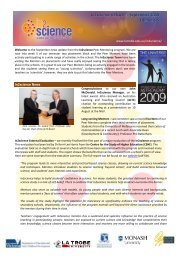The Higher Degrees by Research - La Trobe University
The Higher Degrees by Research - La Trobe University
The Higher Degrees by Research - La Trobe University
You also want an ePaper? Increase the reach of your titles
YUMPU automatically turns print PDFs into web optimized ePapers that Google loves.
<strong>The</strong> <strong>Higher</strong> <strong>Degrees</strong> <strong>by</strong> <strong>Research</strong><br />
<strong>The</strong> <strong>Higher</strong> <strong>Degrees</strong> <strong>by</strong> <strong>Research</strong> (HDRs) are:<br />
Doctor of Philosophy (PhD),<br />
professional doctorates and<br />
research masters.<br />
To meet the Australian standard for a research degree it must consists of at least two thirds<br />
research 1 .<br />
Essential requirements, described in more detail below, include the requirement that to<br />
qualify for a doctoral degree the student must make a substantial and original contribution<br />
to knowledge in a thesis not exceeding 100,000 words.<br />
Note that the degrees also require that students meet eligibility for application criteria and<br />
comply with the Conditions of Candidature for <strong>Higher</strong> <strong>Degrees</strong> <strong>by</strong> <strong>Research</strong> Policy (131012P)<br />
(and Procedures (131013D). Some Conditions of Candidature may be changed with<br />
applications for Variations. <strong>The</strong>se are described in other documents soon to be added to the<br />
Guidelines web page.<br />
Duration<br />
<strong>The</strong> designated maximum<br />
period of study for a full-time<br />
PhD is four years or<br />
equivalent part-time.<br />
For a Professional doctorate<br />
the maximum period of study<br />
is four years or equivalent<br />
part-time, including the<br />
coursework.<br />
1 <strong>La</strong> <strong>Trobe</strong> <strong>University</strong>, <strong>Higher</strong> <strong>Degrees</strong> <strong>by</strong> <strong>Research</strong>, <strong>The</strong> <strong>Degrees</strong><br />
For a masters the maximum<br />
period of study is two years<br />
full time or equivalent parttime<br />
part-time.<br />
Students are expected to take recreation leave and may also take sick leave during their<br />
enrolment. Furthermore, within certain limits, it is possible to suspend and extend<br />
enrolment. <strong>The</strong>se are Variations of enrolment (also called variations of candidature –<br />
control click the blue link to open the Variations document).<br />
Note that Australian Postgraduate Awards (APA), and other government funded scholarship<br />
are paid for three years (not including extensions) and <strong>La</strong> <strong>Trobe</strong> Postgraduate <strong>Research</strong><br />
Scholarships (LTUPRS) and other scholarships administered <strong>by</strong> LTU are provided for three<br />
years and a half full-time or equivalent part-time (but no extensions are possible) for a<br />
doctoral degree. See the Scholarships web page for their conditions and more details.<br />
1 AVCC, 2005, Universities and their Students: Principles for the Provision of Education <strong>by</strong> Australian<br />
Universities, p14
Examination criteria and requirements of the degrees<br />
Award of higher degrees <strong>by</strong> research depend on the examination of completed theses.<br />
<strong>The</strong>sis size<br />
For a PhD a thesis may not<br />
exceed 100,000 words<br />
For a Professional doctorate a<br />
thesis may not exceed 75,000<br />
words<br />
footnotes and bibliography are not counted<br />
the size of theses vary among disciplines and fields of study<br />
2 <strong>La</strong> <strong>Trobe</strong> <strong>University</strong>, <strong>Higher</strong> <strong>Degrees</strong> <strong>by</strong> <strong>Research</strong>, <strong>The</strong> <strong>Degrees</strong><br />
For a masters a thesis may<br />
not exceed 60,000 words<br />
minimum words counts have not been established on a <strong>University</strong> wide basis<br />
a related requirement is the demonstration of "an ability to communicate in a clear,<br />
concise and authoritative manner" 2<br />
<strong>The</strong>sis requirements<br />
PhD and professional doctorates must<br />
make original and substantial<br />
contributions to knowledge. 3<br />
A masters thesis must demonstrate competence<br />
in the design and conduct of a research project<br />
that incorporates methodological skills<br />
appropriate to the discipline and makes a<br />
contribution to knowledge. 4<br />
Examiners of professional doctorates should expect a thesis to make a distinct<br />
contribution to the improvement of professional practice or policy. 5<br />
<strong>The</strong> requirements for higher research degrees that include original creative work are<br />
specified in the <strong>University</strong> Handbook for each discipline that offers doctorates of this<br />
kind. <strong>The</strong> Handbook is published each year although the entries for HDRs change less<br />
frequently.<br />
<strong>The</strong> thesis must be based on work carried out during enrolment for the research<br />
degree (see below, PhD <strong>by</strong> Papers and the <strong>The</strong>sis <strong>by</strong> Published Work Guidelines were<br />
some exceptions are allowed). <strong>The</strong> intention is that the degree is awarded for<br />
2<br />
Regulations 21.2, 21.3 & 21.5 s9(i)<br />
<strong>The</strong> authority for some points stated here is Regulations 21.2, 21.3 and 21.5 which were rescinded July 2009<br />
(<strong>Degrees</strong>, Diplomas and Other Awards Statute 2009, s13). However until new regulations, policies or other<br />
authorities create new prescriptions the old regulations apply and compliance with them required unless<br />
HDC(R) agrees to an exception for a particular case.<br />
3<br />
Regulations 21.2 & 21.3 s9(i)(a)<br />
4<br />
Regulations 21.5 s9(i)(a)<br />
5<br />
AVCC, 2005, Universities and their Students: Principles for the Provision of Education <strong>by</strong> Australian<br />
Universities, p14
esearch training and not in recognition of work, however commendable, completed<br />
and published prior to enrolment at the <strong>University</strong>. Thus, for example, a report<br />
commissioned <strong>by</strong> an employer cannot be rebound and submitted for examination<br />
for award of the degree.<br />
A student may refer to work carried out for another degree or at another institution<br />
but must reference it, and as unpublished work if necessary.<br />
<strong>The</strong>re is also a requirement that the student is supervised.<br />
<strong>The</strong> thesis must include a critical appraisal of relevant literature and available<br />
research, a description of the relationship of the research to the wider field of<br />
knowledge in which it is located, and the contribution to knowledge made with this<br />
research. 6<br />
A thesis must also demonstrate knowledge and understanding of the methodological<br />
techniques and their shortcomings. 7<br />
<strong>The</strong> thesis must be written in a manner appropriate to the discipline. 8<br />
Authoritative statements of the requirements for higher degrees <strong>by</strong> research are in the<br />
Schedule of <strong>La</strong> <strong>Trobe</strong> <strong>University</strong> Qualification Categories. <strong>The</strong> <strong>University</strong> Handbook<br />
(published annually) prescribes the requirements of each Faculty for the degrees. <strong>The</strong>se<br />
Faculty prescriptions may have more details and differing emphases (e.g. professional<br />
training may be included).<br />
PhD <strong>by</strong> Papers<br />
As an alternative to the traditional format for a higher degree thesis, students may submit a<br />
thesis in the form of a series of articles arising from the student’s higher degree research.<br />
<strong>The</strong> Guidelines for PhD <strong>by</strong> Papers are available from the intranet: <strong>The</strong>sis <strong>by</strong> Published Work<br />
Guidelines.<br />
<strong>The</strong>y include discussion of the number of articles and their integration into the thesis, work<br />
undertaken prior to enrolment for the degree, joint authorship, submission of published<br />
books and examination.<br />
Other <strong>University</strong> documents<br />
Other <strong>University</strong> documents relevant to requirements for research degrees are:<br />
Schedule of <strong>La</strong> <strong>Trobe</strong> <strong>University</strong> Qualification Categories<br />
<strong>Research</strong> Student Selection Criteria Policy<br />
<strong>University</strong> Handbook<br />
6 Regulations 21.2, 21.3 & 21.5 s9(i)(b)<br />
7 ibid s9(i)(c)<br />
8 Ibid s9(i)(d)<br />
3 <strong>La</strong> <strong>Trobe</strong> <strong>University</strong>, <strong>Higher</strong> <strong>Degrees</strong> <strong>by</strong> <strong>Research</strong>, <strong>The</strong> <strong>Degrees</strong>
PhD in the Course Finder<br />
For details of the Doctor of Philosophy degrees use the links to the Handbook on the<br />
Students HDR Information PhD web page.<br />
Reference<br />
AVCC, 2005 Universities and their Students: Principles for the Provision of Education <strong>by</strong><br />
Australian Universities section B, 1 to 8 defines the degrees. Sections 11 to 16 describe the<br />
responsibilities of Universities, supervisors and students. Other sections of <strong>The</strong> Principles are<br />
referenced where relevant in this document.<br />
4 <strong>La</strong> <strong>Trobe</strong> <strong>University</strong>, <strong>Higher</strong> <strong>Degrees</strong> <strong>by</strong> <strong>Research</strong>, <strong>The</strong> <strong>Degrees</strong>


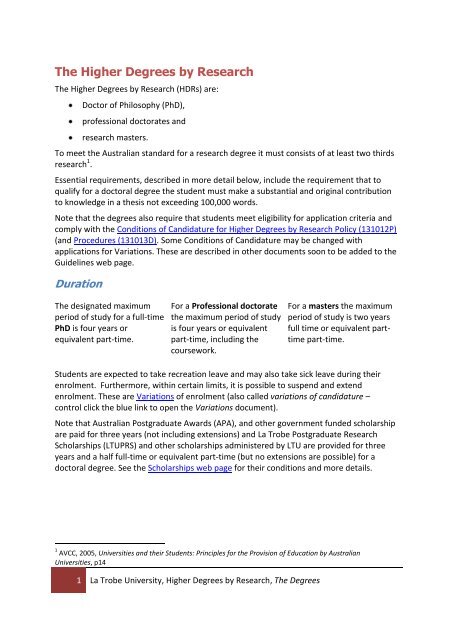
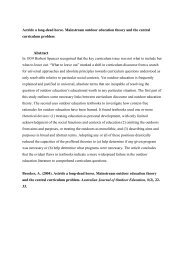
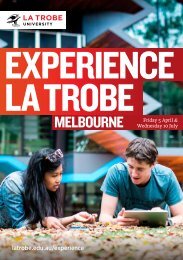
![Ottoman Empire course brochure [PDF 612KB] - La Trobe University](https://img.yumpu.com/12001562/1/184x260/ottoman-empire-course-brochure-pdf-612kb-la-trobe-university.jpg?quality=85)
![Getting Ready to Talk Manual [PDF 315KB] - La Trobe University](https://img.yumpu.com/11430807/1/190x245/getting-ready-to-talk-manual-pdf-315kb-la-trobe-university.jpg?quality=85)
